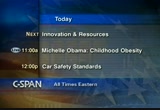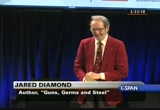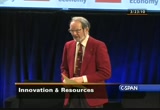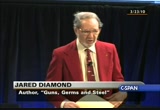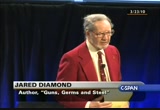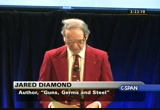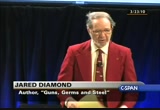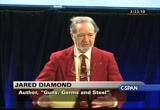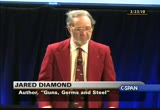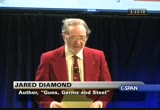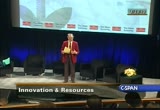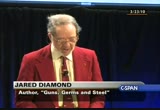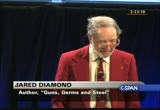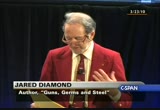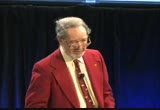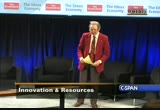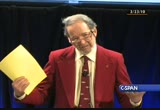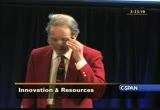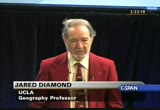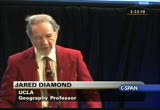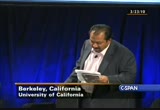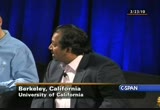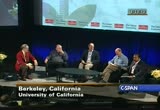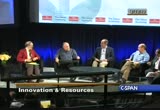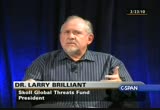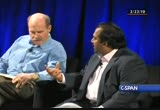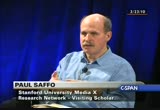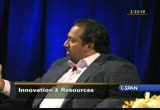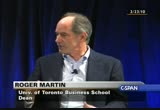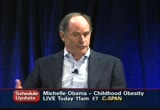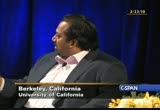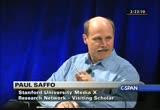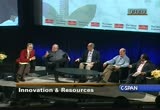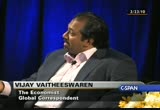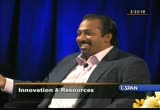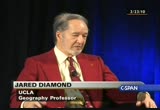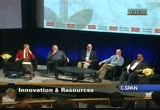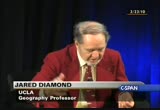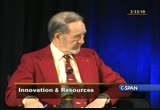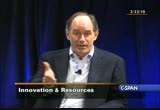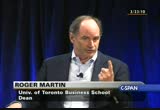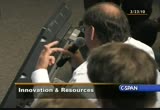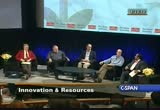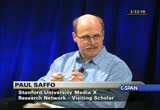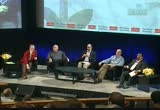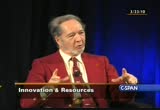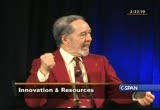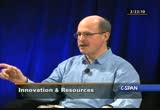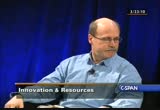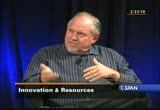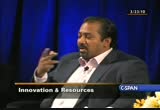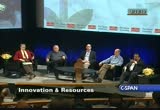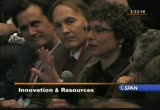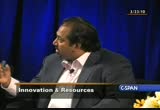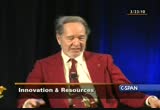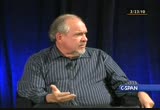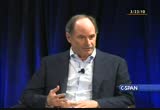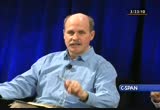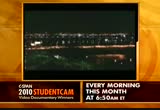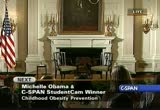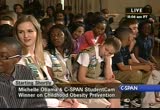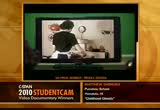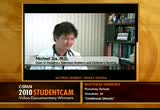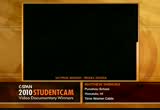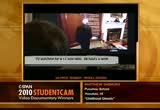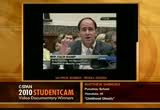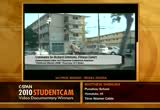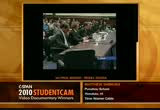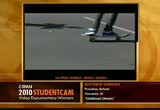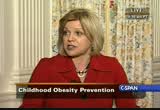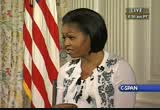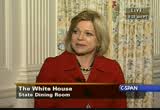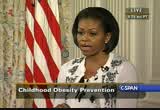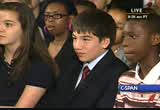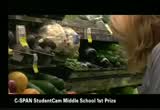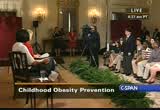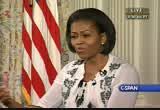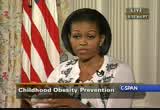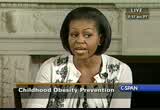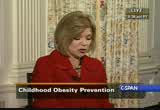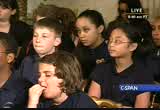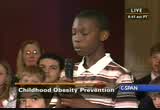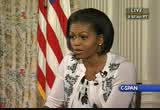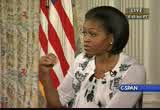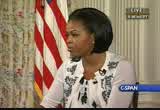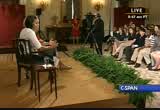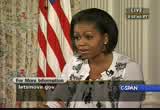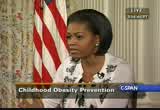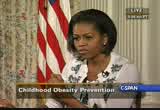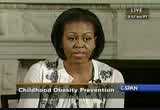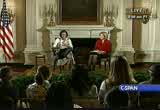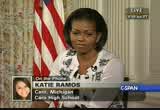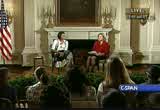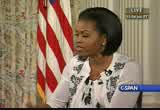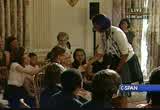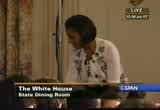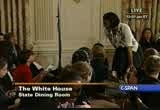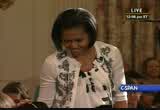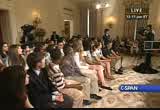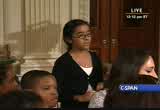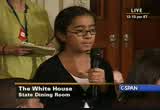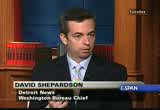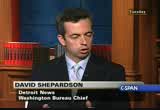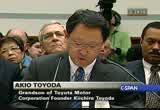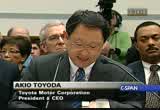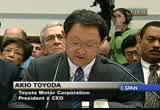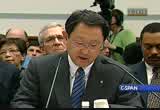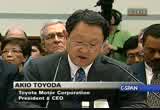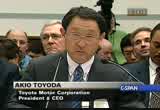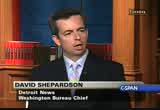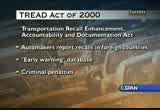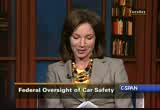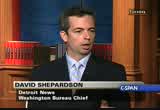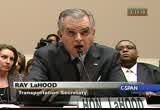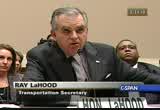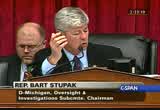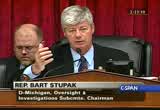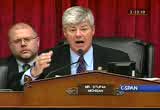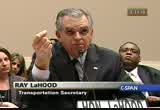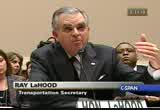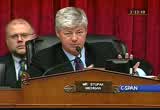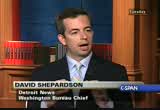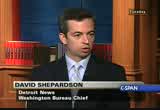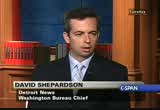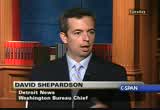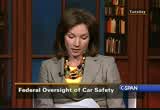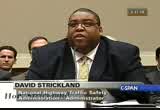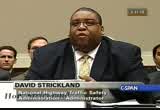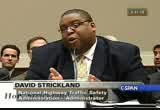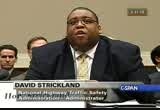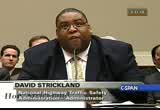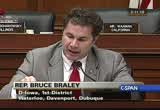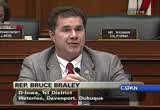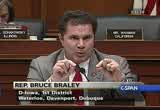tv U.S. House of Representatives CSPAN April 7, 2010 10:00am-1:00pm EDT
10:00 am
are offering, arturo vargas is there executive director and naleo. about one hour from now you can see michelle obama talk in a town hall format about childhood obesity. our winner will be featured in that. he is from honolulu. thanks for watching the program. [captioning performed by national captioning institute] [captions copyright national cable satellite corp. 2010] . .
10:01 am
>> you are watching c-span, created for you as a public service by america's cable companies. next, a conference on the future of innovation resources. at 11:00 eastern, first lady michelle obama sets down with c- span studentcam winner in honolulu. falling back, two former administrators of the national highway tracy -- national highway safety administration discusses safety standards.
10:02 am
last month, the economist magazine held a conference on the future of innovation. scholars talk about how it bought innovation can conserve resources. this is one hour. >> talking about the rights and challenges of the 21st century, all of which i will we may gloat -- we may go toward a global collapse. that is no longer possible. another thing new is global feelings on resources, resources such as energy, water, seafood, photosynthesis which are under pressure around the world.
10:03 am
the third thing new under the sun is that it is now impossible to maintain inequality around the world in per-capita consumption rates. that is something i will talk about more. finally, new under the sun is that we at last have a time limit. all these problems will have to get solved within approximately the next 50 years because we are sitting on a series of time bombs such as energy, water, and climate. these are time bombs involving limited resources or resources that are being exploited which could run out over the next course of the next couple of decades if we do not change our direction. either we will solve these problems in the next couple of decades pleasantly or they will resolve themselves unpleasantly of ways that we do not choose. what innovations do we need to solve these problems?
10:04 am
it is not only societies and is that those problems but individuals, companies face challenges. i see a broad framework for innovation at all these levels. this is so our society can learn from successes and failures from individuals, countries, and companies. let's start with challenges faced by individuals. we as individuals face personal challenges and crises which to all know about. our relationships break up. we may get divorced parent from a loved 11 or they may die. we get fired and promoted. we have a shot or set back. all of these things through us into a crisis all into question
10:05 am
our values and our ways to approach them. you have to face a cruel truth. psychologists find that these personal crises last about six weeks because you cannot stay in limbo for ever. within six weeks, either you succeed in finding a new and better way of coping or some people give up and remained stuck in their old ways. a key to success in dealing with a personal crisis is selective change. your initial sense of crisis is of being overwhelmed with problems. it seems that nothing about who is working well. all of your values or called into question. other people go to the opposite extreme and practiced denial. they may say that they are okay and refused to change anything at all. for all of us in a crisis, some parts of us really are functioning ok and do not have to be changed but of the things
10:06 am
need changing. the key to dealing with the crisis is what psychologists call draw a fence. you know longer feel overwhelmed as you can start to change what is inside the fence. for example, if your company goes bankrupt or you were fired, then you need to change your business strategy. it does not mean you're a bad spells are parent or you are socially in that even though initially, you may feel that way. why is it that some individuals succeed in borrowing for personal crises while other individuals remain stuck in their old ways? partly, it depends on whether or not you have had models of new solutions to your problems, people that you know or you have read about. it also depends on whether you have had previous experience of success or selected change.
10:07 am
a big part of success been a personal crisis is what psychologists term rigidity as opposed to flexibility. you can change one piece of yourself that a tiger their rigid person for whom everything inside to is interlocked cannot draw a fence. there is a person would say that talking to your children cannot seen in isolation but gets mixed up with religion and family values and your whole personality so you never figure out how to change or talk to your children. that issue of -- purses flexibility is one of the major issues of the underlying successes of working for individual crises. similar questions arise to individuals but also tribes. the 300 + tried to north america and the 1000 tribes i work with
10:08 am
in new guinea. there are big differences. all tribes around the world are facing the stress of being overwhelmed with the first world. there are big differences among tribes and how they cope with the stress of first world society. in the north america, why is it that there are far more navahos than any other group of north american indians? there are 200,000 navajos. but wanted years ago, there were 5000 navajos. 500 years ago, if someone does the north america, no one would have guessed that navajos would be the most successful and made of north american tribes in dealing with the modern world. why? some of it is the luck of geography, where they live but a big part of it is navajo social flexibility. navajos can continue to speak navajo and to live in big traditional tribes while at the same time driving trucks and herding sheep which they never have and making great silver
10:09 am
jewelry which they never did and playing basketball which they never did and mary non-navajos. they still consider themselves navajos. the navajo are in extending example of social flexibility, selective change. the navajo manage to to change things inside the fence like playing basketball and driving trucks and changing single pieces of their culture is well outside the fence, there remained navajo. they have been set the -- they have been conspicuously successful. these questions about selective exchange, something new under the sun, a rise not just from individuals and tribes. they also arise at more successful companies. why is it that procter and gamble is held up as an example of a success story of a company that has gone on for a long time
10:10 am
and got your changes but has coped. successful companies, companies that remain successful for a long time, or ones that succeed in drawing a fence and reinventing themselves and figuring out a problem and change what is inside the fence. they cope with crises. in a changing business environment but retain their longstanding corporate identity. the final level and the one i wanted to about most after individuals, tribes, and companies is the level of countries and will societies. societies in countries face crises. some societies refused to adapt and the collapse like easter islanders or they get out- competed or die out. conversely, other societies go to the opposite extreme of casting away their entire
10:11 am
identity and they merge with other societies as is happening to what you tried the new getty that are losing -- new guinea better losing their identity. just as with individuals, tribes, and companies is have to change selectively and maintained at the same time much of one's identity. two outstanding examples of selected change in the large state societies in the modern world are the selective change of japan beginning in 1860 and the selective change in the u.k. after world war two. i will talk about the a bed of the change in the u.k. which is prepared by lipper. i moved to the u.k. in 1958 and lived there for quite a few years. the traditional image of the great britain up to world war two was of the mightiest empire the world has ever known, and empire were the sun never set. they owned the largest fleet in
10:12 am
the world and british people viewed themselves as parliament. before i moved to the u.k., there were three blows that shook this british self identity. 1956, the failed suez invasion made clear that britain was at the end of an era where it could pursue an independent major world foreign-policy. in 1958, when i was moving, britain scrap the last three battleships that had. that was the end of the world's most powerful fleet. a few months before a move to the u.k. in 1958, there was the nottinghill race riots, making clear limits to british parliament. during the years i lived in the uk, i sought the british struggling. i saw it on the advertising. i sought among the british people. some british people were trying to cling to the old ways. an example of that was field
10:13 am
marshal montgomery arguing against entering the united kingdom and saying that the british to keep out of europe and shore up the commonwealth. that was praised in those days. some of the british people want to the other extreme and wanted britain to merge completely. a friend of mine was pessimistic and said that britain would become another poor european country. in those days, portugal was pour so my friends said that britain would end up just another poor country like portugal. what actually happened is that the u.k. found a middle way by means of selective change. britain jettisoned the empire. they ended up with only a small fleet. it became part of the european union but britain is the most distinctive and then a part of the european union. they found a way to become or remain a world leader in
10:14 am
science, technology, innovation, and agriculture. there have been massive changes in british society compared to 50 years ago when i was living there. these are changes that i never anticipated. despite these changes, england will still be england. britain succeeded in drawing a fence and changing things inside the fence and remaining british outside the fence. a fundamental world challenge to be faced today is unequal and unsustainable consumption rates around the world. per person consumption rates of energy, water, and metals and other things in the first world average about 32 times those in the developing world the average american consumes more fuel and metal does than the average citizen of kemnymnya. those consumption rates are unsustainable.
10:15 am
people in the developing world know about the first world lifestyle. they do not like the inequities. as long as on equal consumption rates continue, immigration will continue on stubbly, there is no way we can keep out the hundreds of millions of people, billions of people in the developing world who cannot wait for other countries to become proper -- prosperous. terrorists will continue and wars will be unstoppable and it will be a matter of time before terrorism and wars involve nuclear weapons. our present situation is uniquely dangerous in world history because the risk we face now is the rest of the global collapse. does no longer possible that a country can collapse in isolation. when easter island collapsed in 16 a.d., no one knew about it. -- in 1600, no one knew about it. -- in 1680, no one knew about
10:16 am
it. everybody knows about this stuff now. somalia is one of the poorest countries in africa. the state governments collapsed in africa and that is affecting people around the world because desperate pirates know about the wealth represented and the rest of the world and their ships are hijacking ships coming out of the red sea. the global financial crisis of a couple of years ago illustrates when one economy hit rough waters and the effects of the economies around world. i can promise you that the only sustainable solution to the world's problems a few decades from now, if there will be a first world economy, will be an economy that will be more nearly equal as between the first world and the third world because any other solution is not going to be tolerated by the developed world. the developing world has found ways to share its unhappiness
10:17 am
with the first world. this reality presents challenges especially for americans. we americans have had the highest per capita consumption rate in the world. the american dream is that everything is possible for everybody in this land of infinite resources. our patriotic song talks about spacious skies with m. berkowitz upgraamber waves of up brain. of grain. we americans have to understand two fundamental insights. inside number one is that we americans are confused about the difference between consumption rates and standard of living.
10:18 am
consumption rates are related to standard of living but they are not coupled because much of our consumption is wasteful. it does not improve our standard of living if you are driving humvee giving you 40 miles per hour while someone else is driving a prius, did you 45 miles per hour. much of our consumption is wasteful and does not contribute to our standard of living as seen in the fact that the consumption rate in europe for petroleum and other resources are about half those in the united states plus the standard of living and western europe is higher than the united states as gauged by life span, financial security, access to medical care, child survival, access to arts, public support for arts.
10:19 am
europeans have lower consumption rates but such a somewhat higher standard of living. if you want to argue about that, let's take an extreme case. american consumption rate incomes are about seven times higher than in cuba. the cuban government, as a matter policy, has insured that infant mortality in cuba is lower than that of the united states, making clear that much of our american consumption does not contribute to any reasonable definition of standard of living, such as whether your child lives or dies. the other big -- the other thing new under the sun for americans is that we have to realize that insulation of the elite, political or economic from the consequences of their actions in the past has been the cause of the collapse of decided. it is the recipe of desire if the league do not suffer from
10:20 am
the consequences of their decision. contrast hurricane katrina with the north sea plots. floods. americans in new orleans allowed the disaster of katrina to happen. we and the united states live in a gated communities within our country. we have gated communities and we are rich people will fall from the outside world. we americans are living as of the rest of the world was a gated community separated by oceans from the rest of the world but the gates no longer keep up immigrants or terrorists. we need a wall but the wall we need is a wall was and ourselves to draw up a fence and figure out what traditional american values make sense and which ones must change. thank you. [applause]
10:21 am
>> thank you professor diamond. in addition to provocative and i opening keynote, let me commend you for sticking to the time limit. that is a lesson that all the speakers should learn from. you are an example to us all. i will invite our first panel to discuss these ideas and take them forward. let me introduce larry brilliant, president of the global fund. roger martin, the of the crop and school of business at the university of toronto. and paulsaffo, a futurist at stanford university. [applause] you've covered a number of things in your opening talk but
10:22 am
one of the themes went back to the great and amending question of your pulitzer winning book. why do we have so much cargo deck that is a? you make the argument that stuff is not the same as quality of life. what is wrong with having stuff? is there something fundamentally -- is a moral question or a question of an ecological footprint. can attach -- can we attach analytics to this or this is a moral judgment that you don't like us having a lot of stuff? >> there is not a type correlation between stuff and standard of living but all those things being equal, i would prefer to have stopped. i have chosen to live in the united states rather than to get
10:23 am
it because i love the jungle over there but most of the year, i like to be home and listen to opera and live in-house and have a good food supply. [laughter] there's nothing wrong with having stop, as long as we have the rest of the world who has just as much stuff. >> let's pick up on the idea of enter linkages. -- enter linkages. interlinkages. failed states now have security implications for us that crossover. larry brilliant, you spent a lifetime thinking about these problems. you're the head of an organization that looks at
10:24 am
global challenges. what do you think is different now about the challenges, if indeed anything? you are devoting more resources and talent to this. how do you look at this problem? >> i am still thinking about it. i think we all are. that is why we are here. it is one of the differences is that there are so many people now thinking about it. as i look at all these different global risks or global threats or catastrophic risks, i think there is a common body of knowledge and maybe half a dozen or a dozen things that they all have in common. it is not the things we usually think about. number one, we cannot communicate a. the rest how'd you communicate a 10% risk of a pandemic that will kill 10 million people. is that something i should worry
10:25 am
about? the kills 1 billion people, yes. what are we doing about decisions with great uncertainty with a time like improbability? how do we deal with science which is the art of uncertainty, taking it and wrestling it down. number 4, where are the great leaders? where is nelson mandela and gondi to talk to us in ways that we can understand and communicate to the average person that they have got to give up not just their big stuff but their jobs, their chance for the future, dealing with things they want for their kids' education now because if they don't, three generations from now, it will be terrible and as you say, we are running out of time. the last to two things -- >> >> you have given a couple of challenges.
10:26 am
are these best addressed by the great leaders by the top down? should we have scientists and top leaders think about them and be serious about them or are distributed solutions in order? let me p turn to aaul. -- let me turn paul. are we getting to a point where we need to look for solutions from different places, particularly from the bottom up and maybe slightly anarchic ways? >> societies tend to resemble the communication systems they are built around. corporations are the same way. in the 1960's, corporate structures look like mainframe computer architecture. today, they look more like networks. what is happening with global governance is that our global
10:27 am
governance entities are going through a very painful process of moving from hierarchy-based to a network-based. that means there are stills. there are still points of influence that are greater than others but we have to think of them as networks rather than formal hierarchies. your comment about the nation, i am on record as saying there's maybe 50% chance that the united states will exist as a nation by the middle of this century. what i am really saying is that what has happened to nation states is that they have an exclusivity of persons in international lopper they had a monopoly until the 1950's and the beginning ofngo's. the loss the monopoly and now we have a new world in which the new center of gravity of international governments is the city state. it is that unit of life and
10:28 am
economics and governments that is large enough to have a global impact, take silicon valley, but also small enough that everybody and it knows where they belong. that is the secret. >> i want to keep our focus in connecting these problems we are talking about towards the pathway to solution. if we are facing a number of these challenges, we have many of these problems, the question becomes how should we respond? roger, you talked about rethinking capitalism. can you give us a sense of how you're thinking about that and how that might connect with a -- overcoming some of these issues? >> i concur very much of that it is important for every human to know where they fit in their
10:29 am
community. if they don't fit, they will be unhappy. if they feel anonymous, they will be unhappy with their community. i like the notion of what is inside the fence and not. i think we have inadvertently got into a point in the capitalistic system, especially in america, where something happens that we should pay attention to and we haven't. that is that rather than as rewarding people who create net value for the community most, we are now rewarding at the highest level, people will create no net value but simply trade. in 2008, the person who made the most money in the world, particularly in america, was james simon, had a renaissance technology who took home $2.5
10:30 am
billion for trading over 100 million shares and creating no net value. >> surely, he is creating a will of value. -- a wheel of value. will we have a system or certain forms of commercial activity are worthwhile and others are not? >> we always have. we have this view that when the form of commercial activity is not helpful to the community as a whole, we incorporate that into the system. john d. rockefeller brought that monopolizing all the oil in the early 20th century was a good idea and allegedly he would blow competitors to do that. we enacted anti-trust legislation that said that was not a net benefit in the community. was benefiting him but not the community.
10:31 am
now, we have a system where we are rewarding, to a great extent, activities that do not benefit the community or create an environment where it is harder for companies to invest . >> we have had a challenge, those of you in the audience, who are in grade in profitable but. as capitalism, you have been put on notice [laughter] . we had a court rejoinder to that. >> the problem with our society is that our mets are struggling to catch up with our capabilities. we have had a best growth in community and the. our technology i challenge you to turn off your blackberry for 30 seconds. communications has become like oxygen. after 20 seconds, if you do not have it, you notice it is missing. in a man and have you get a headache and tremendous your unconscious and 60 minutes, you
10:32 am
are dead. >> it sounds like we have to get a handle on the black bears [laughter] a. >> the problem with the message is that we solve the problem creating communities. we have three of them but the new problem we have created, especially in this country, we are struggling to move away from the myth of independence and towards the method of. interdependence i would argue that the vote we had last night was a struggle in this respect, the health care. everywhere we look is how we should this notion of independence and adopted interdependence? that, to me, is the simple task we have to do as a global society is adopt interdependence. >> i wish i could agree but i am not sure. america has always been a place that is valued communities and interdependence of communities. i think what is happening -- >> what about the fundamental rugged
10:33 am
individuals? >> we have always had a rugged individualist myths. . this is what makes a great . >> there were always acted out in communities. people are simply confused. >> reagan, the cowboy, bush, the cowboy. >> i will turn to the audience and a few minutes of get your questions together. >> we have been challenged with new things under the sun one of which is that we are running out of time. does democracy work in a world of those limits? i am not talking about population dynamics but how does the average person learn enough about the complex risks we have a world is running out of time and running into limits? >> let's take that question to
10:34 am
jerry diamond. you talked about elites being isolated from the problems that society faces. what insights can you give us about democracy? is the capital system we have up to the task? >> the alternatives are worse but certainly what i do and all of us here are doing is addressing the problems that interest all of us are complicated problems. they have to be explained clearly to the whole world. in a democracy, if the voters don't to the right thing, it is up to the voters and of that leading thinkers can convince
10:35 am
voters to do the right thing, it falls on the leading thinkers. we are not succeeding in explaining things clearly. all this in academia and know that the academic world does not provide much award and does provide disincentives were trying to communicate clearly to the public. [laughter] >> i won't let you off the hook. in the case of america as well, where we find ourselves in this moment in history, >> you are in california. [laughter] >> that is a fair point. do you think our system is resilience and of tax what is your intuition? you have issued a clarion call for us to do better. do you think we will? >> in principle, yes. our problems are solvable because they are all problems that we are causing ourselves. i am not worried about an asteroid beyond jupiter pearlihurtling toward us.
10:36 am
whether we will succeed in solving these problems is the question of what will we americans decide. i cannot predict the outcome of the next election. all i can do is predict that if we take our problem seriously and sometimes we do and sometimes we don't, we will be capable of solving them. there are good reasons to be pessimistic about americans taking our problem seriously. on the other hand, last sunday we took something seriously and we took a vote on it. we need to make more good decisions and pure bad decisions. >> with that, let's get some questions from the audience. there is no shortage of hands immediately. wait for the microphone. please, identify yourself and your affiliation, if you like. please, make it a question, short, sharp, preferably with [laughter] the. ty. [laughter]
10:37 am
i have stationed burly guards on both sides of the conference venue to grab the microphone from you if you should violate the chairs orders to get to a question. what we start in the middle of the front row here. we will go for the second question, let's get a hand. do we have anybody there? let's start here and i will look for someone in the back, please. >> thank you for the stability beginning. i have a question for dr. diamond. you mentioned it takes six weeks for individuals to cope or give up. is there a similar limit for society? if there is, our way out of time already and have you given up? >> society is not something that corresponds to the six weeks. the six weeks for individuals have to the difficulty of living in limbo and that is an observation by psychologists.
10:38 am
personal crises start to get results or people get up and six weeks because you cannot function with nothing for more than six weeks. i don't see any correspondence with society. there are societies that have struggled for decades with problems and there are societies that solve problems acutely within one year or two. in the case of japan, it began in 1853 and ratcheted up in 1861 and japan did not become a world power until the middle of the 1900's. that was a change of the course of a century. in the case of the united kingdom, it changed from being the world's most powerful empire to finding a happy new state in several decades. >> a question here? >> dan altman. my question is for the panel. most of the challenge is that your outline are ones that require one of two types of
10:39 am
solutions, either an up-front costs that have to pay to get long-term benefits or who have to create some sort of coalition where everybody has an incentive to join. i would argue that our current political is politicians are about doing those two things. with short time horizons. we do not like to cooperate or give up sovereignty. i am more pessimistic than perhaps professor diamond about our ability to solve these problems with our current political structure. >> i did not know anybody was more pessimistic than generate [laughter] . you have said that pessimism is the new black parent [laughter] . [laughter] >> i think they're simply not enough people devoting their careers, their lives, their work on academic and everything else they do, to solving these
10:40 am
problems. we're good at solving problems when we put our minds to them but we do not have enough people. we don't have enough careers. we don't have and a graduate courses to solve problems like these to give people a chance to have careers of these things. if we did that, i think the world would change dramatically. i think we have to do that, and i think we will. >> i am optimistic. i am canadian but i am optimistic about america. >> it was said that more people need to get in these careers, you run a business school but you are one of the leading thinkers on problem solving. can you give us a perspective for people getting into this field? what are useful tools that one can devote to trying to problem
10:41 am
solve? >> i think teaching our students not to be reductionist in thinking that everything is not either/or is critical. that is what most education has become, reinforcing the notion that your job is to choose between options. we have to teach them the tools for taking a stance that says my job as a great option. it is absolutely doable. the students love it and i think will produce a whole bunch of people that believe this. >> before we get to the next question, let me get a couple of hands of so our runners can get to you. we will have a lady that comes next. please identify yourself, make it a short, sharp question. >> i am from perot. u.
10:42 am
it is great to see you. why are some third world countries doing even better these tests than first world countries? what are we learning from these countries? >> when you say doing better, economically? >> for example, a pre eru, we don't have inflation. in -- peru, we have no inflation. >> china has been spurred the initial crisis, by and large. this is a good time to put your eggs in the emerging market basket rather than the u.s. does anybody want to take on that question? it is argued that this is the
10:43 am
century of the east. asian values will dominate. this is -- this is a discredit western model of democracy. is this a long-term secular shift or something cyclical that we will seek fadeaway and 10 years from now? >> what we could do is we all could refuse the question and the chair has to answer it. i would offer one specific observation rather than a generalization. we're all watching china with bated breath, waiting to see what happens. if one looks at china has starkly over the next -- over
10:44 am
the last 18 years, all other government officials are engineers or -- hours are lawyers. draw your own conclusions [laughter] there's a structure which seems the way the chinese government works is in a state of what a friend of mine likes to say is dynamic tension. does not that they are stable in the center, there is a dynamic tension and the give-and-take and that dynamism allows them to respond much more quickly to changes in the environment and that is something lacking in the united states . >> let's leave it for now a will haveraina huffington onstage bringing up the topic if the united states is becoming a third world country.
10:45 am
there is a microphone a wedding and we will come to the lady next. >> -- there is a microphone waiting and we will come to the lady next. >> australia has the smartest tax reform and the world. -- in the world. >> was cut to the question in the back them up i am president of my own country >> i am surprised we have gone this long and no one has challenged the jury about in the limits on resources. it really doesn't matter. if we run out of stuff, we will move to other stop. the people die because we run out of stuff, we will make more people.
10:46 am
there's a notion which should be afraid as economists of running out of resources which is absurd. >> let's put it to jerry diamond. you'll hear more about this in the second half of the panel. >> thank you for formulating the point of of du clearly. view clearly. history teaches us the fallacy of that point of view. you cannot run out of forest. you cannot run out of topsoil. you cannot run out of seafood. you cannot run out of water because there are more of these things. there are people today who
10:47 am
adhere to this stance that technology will solve our problems. anybody is aware that technological solutions always bring unsuspected negative consequences with them. my tutor at college was a person who was alive than the beginning of the 20th-century. he said when the automobile came in in the early 1900's and was replacing horses on the street, people held the motor car. it was going to make americans it is clean and quiet by driving out horses. the motor car has had unsuspected consequences. that is universally the case with technology and ensure there will be an adherence to this silly idea that technology will save us. >> this is perfect. keep this in mind when r listen toay.
10:48 am
the debate going on in society today, you sit around global climate change, but i think it spreads into all the issues we are talking about. on the one hand, there are a. engineers on the other hand, there are druids. the engineers are optimistic of faster into the future. they say they consult any problem. the druids are by nature pessimists and they say that no matter what you do, it will all break eventually, no matter how big the mountain is, it will end up as santa in the ocean. -- santa in the ocean. the engineers tend to be the builders, a silicon valley, engineering types. the pessimists tend to be earth scientist, biologist, geologists' because they are reminded of the pri if ray is the art engineer, is interesting
10:49 am
to think about who the arch- drew it in this conversation is that not no names will be mention. >> the answer is that there is a middle ground between the two. in this age of fashionable pessimism, the danger is that everybody always slides to the extremes. one group says the answer is to go into the future and the other group says we need to go into the past. i hope they both lose the argument . >> let's turn to the lady. >> with all the feelings of dwindling resources, we are feeling boxed in. we're talking about people who cannot participate in these conversations. who defines the fences? how do include the voices of the others who can innovate?
10:50 am
>> if i can rephrase your question a little bit -- we talked earlier about population pressures and it is like the idea that if the number of people times the amount of cargo that they eat pushes up against these limits. i would argue that the way of solving that and bring everybody into the conversation is not whether you're an engineer or not, is good technology, it is good innovation because the solutions are not readily apparent unless you really study it. the single best way to population control is to ensure that girls are educated and be sure that every child is kept alive and every community is kept precious. then people reduce the birth rate and everybody gets into the conversation.
10:51 am
you don't wind up with the end came up 9.6 billion people consuming the way americans do. that is what we are trying to avoid them up. . >> how do 4 billion people participate in this conversation? while all of history has been that way, this kind of innovation has been the reserved eli of thete 'ph.d.s and others and those with the bankers of the victorian era. we have seen dramatic changes in the last couple of decades in part due to rising living standards and in part because of technology and enter connectivity and globalization. this makes a more democratic era of innovation.
10:52 am
it is a wonderful world and which we can't solve all the poverty but to give an example of how this is the most optimistic time for those who are concerned about empowerment. let's get a few more questions. i will take three questions, in the interest of time. let's come down here. the third question will come to this gentleman here. i will take all 3 questions on the panel will answer in the interest of efficiency. it is important that the short -- you be short and to the point. go ahead. >> i am from cal state fullerton. i'm surprised that professor diamond did not mention the great cultural wars going on now.
10:53 am
it may be different religions or china vs. the united states. do you see this as a fight for resources, primarily? >> let's take the second question. >> i am from the school of information at uc-berkeley. what would you do if you have global resources at hand to rebuild the world? >> my question is to professor diamond.
10:54 am
is there a link between consumption and the standard of living or quality of life, what is the role the marketplace regulating the consumption since t? >> you are not asking about regulation by government, just the market itself? >> yes. >> let's start in reverse order with that question. >> i can't comment on the positive role in the market and regulate consumption. i am often perceived as being negative on the role of the market. i have been struggling the last decade with the fact that the companies have been adopting sensible low consumption policies because they discovered they can save money that way. wal-mart and noticed for five years ago that there's an
10:55 am
average gas consumption of the 8 miles per hour per it will mark cut the lead they could save a lot of money if they had more fuel-efficient trucks. they are working towards trucks that averaged 18 mpg. they are doing by having trucks that have hybrid 18-wheelers and. rs. there also greatly reducing their plastic packaging because what comes in have to go out. that costs money these are some examples of how some american businesses have discovered that they can save money by reducing waste and consumption. >> let's turn to the first question. there was a question about clash of civilizations and cultural wars. when you think about the
10:56 am
limitations of democracy and the appendages, at least temporarily, of having an authoritarian model. is this a dominating team or filter to think about? >> you talk about singapore and you could hear some admiration for the way of governance. in the short term, it is great to have a market. in the midterm, it is great to have an oligarchy or dictatorship. long term, you have to have a democracy. we have to work with the democracy we have and the only way you fix it is make it possible to an powerboaters of the understand the issues cra cut ap about 15-second commercials. you have to take it seriously. that means each of us have to take it seriously. if we do that we win. the world wins. >> we have a couple of minutes left.
10:57 am
let's get to the deans question about building and innovation in the economy. if you have the resources, what should we do? >> thank you for the question. i would teach deductive logic. we do not. we need to practice it. we have an educational system but causes people to draw apart as soon as possible and to extend the sizes as that the only thing science is supposed to do is to test hypotheses that exist. we do not teach our people in this country how to create new hypothesis. >> it is riskier to do that than the traditional kind of methods.
10:58 am
>> it depends what you mean by risky. >> we will take this topic up tomorrow morning, the role of risk and failure and had to embrace and take this and the right way. let's leave that as a marker for tomorrow, the first session in the morning. >> innovation in e is thenluis activity. it should not become so established that it cannot be dislodged. silicon valley is very good at creating open elite. we have a process of turning out laws and to establishment but making sure there is another rebel cause of to the side to knock them off. i think that is the answer. >> i will draw this panel to a
10:59 am
close. join me in getting a warm round of applause for our panel. [applause] >> all this month, see the winners of suspenseca studentsm video documentary competition. students at from 45 states submitted videos on the country's greatest strengths or challenges. watch the top winning videos every morning on c-span at 6:50 eastern, just a "washington journal before." at 8:30, meet the students who made them. for a preview of all the winners,ca is am a student.org. right now and all this week on c-span 2, live coverage of the financial crisis inquiry commission. they're focusing on subprime mortgages and the role of citigroup. the panel hopes to publish a final report on the financial crisis by mid-december. see the commission like this week on c-span 2. [captioning performed by national captioning institute] [captions copyright national
11:01 am
11:02 am
but the truth is these numbers don't faint full picture. and it's fortunate say this. the words overweight and obese, those words don't tell the true story. because this suspect about inches and pounds, and it's not about how our kids look. it has nothing to do with that. it's about how our kids feel and how they feel about themselves. it's about the impact we're having and the impact this issue is having on every aspect of their lives. doctors are seeing kids with high plood pressure, type 2 diabetes, and our teachers are telling me how they are seeing the bullying, the teasing. our school couplors see the low self-ezz steel and coaches are seeing students unable to keep
11:03 am
up or worse yet unable to engage. >> our military reports obesity is now one of the most common qualifiers of military service and we are spending outrage otherwise amounts of money treating obesity related conditions like diabetes, heart disease and cancer. and public health experts as tiki said tells us the current generation is on track to having a shorter life span than our parents. and fun of us wants this future for our kids and none of us wants this future for our country. so instead of talking about this problem problem and worrying and wringing our hands, we have to act. so let's move. let's get this done and work to get families and communities together to make healthy
11:04 am
decisions for their kids. let's move to bring together our governors and our mayors, doctors and nurses, community groups, athletes, moms, dads, you name it together to tackle this challenge once and for all. and that's why we're here today to thraumple wonderful new campaign called let's move. let's move! let's hear it. let's move! [applause] we'll hear more from our first lady. you can see she is being joined by students from the washington, baltimore area. also participating in the conversation today will be some of the students who entered films on obesity in this year's c-span documentary including
11:05 am
the 7th grade from honolulu whose video won first prize. >> more than 30% of school children are now obese. >> the number one health care our children is faceing the childhood obesity. >> they have a huge problem. >> childhood obesity crisis in the united states cannot be overstated. >> thing were different years ago. get to play outside after school and on weekends. >> mom stayed at home and prepared meals for their families. kids road their bikes or walked to school. now kids have about five hours of time with tv, video games. kids no longer play outside after school. kids take the bus to school or their parents drive.
11:06 am
as of 2008, about 70% of children under 18 are in this and we have become a fast food nation. as a consequence childhood obesity has more than doubled and one in seven low-income school children are obese. this is a problem that affects us all. to get a medical professional's view on childhood obesity i talked to my speed -- my 350ed tradition. my pediatrician. >> obesity by definition is actually measured in a per century nile a growth curve or a calculation called the body mass index. >> what are the medical consequences for childhood obesity? >> hyper tension, which is high
11:07 am
blood pressure. high cholesterol. also bone and joint problems and also some of their organs can have problems like their lung and heart. also there's diabetes, a specific one for kids that are really overweight. that's called type two diabetes. some of the causes for obesity is children that probably have too much to eat or take in too many calories but don't have enough calories to burn up. and sometimes it takes just little adjustments, perhaps not eating the high-calorie foods. or high sugery caloric drink. sometimes it's just as easy as just getting a little more playtime or activity. >> we live in the land surrounded by calorie-rich food. it's easy to take in too many calories. calorie dense foods are cheap
11:08 am
and pleptful with brands familiar to shoppers and their kids. even when families want to serve healthy food they may want have the resources to buy healthy foods. after all, nutrition foods are expensive. nutritious foods also require preparation. while calorie-dense foods are easy to eat. 8-18-year-olds spent about four hours a day watching tv, d.v.d.s and video games. the kneel son company reports kids ages 6-11 watch about 28 hours of t a week. that's time not being spent outdoors getting exercise. at the same time school exercise programs are being sharply cut back. but it's hard to make the balance of nutrition and exercise work out. in fact, childhood obesity has
11:09 am
been recognized as a national problem. >> it's clear childhood obesity has become one of the most pressing challenges faceing the nation. >> adolescents are overweight and by 20 10 it's estimated one in five children in the u.s. will be obese. >> the number one health care crisis our children are facing today is not cancer, or accidents. it's not drunks or alcohol. or smoking. it's the childhood obesity. >> by the fourth grade they are sentenced to a life of challenges and physical problems associated with obesity and hyper tension and high blood pressure, they may never live to their fullest potential. >> in many communities, you can a weapon sometimes faster than
11:10 am
you can find basketball or food. >> you'd be hard-pressed to find superparks with nutritional foods. >> many kids don't have a lot of options for liver ago healthy lifestyle. >> it's kids are not walking to school. the greater percentage is taking the bus. when they are in school there's little physical activities. when they are out of school -- >> there's a lot of neighborhoods where kids cannot go outside and play anymore and a lot of parents who are afraid. there's not enough parks or recreational centers and they shouldn't go without their parents at a certain age. >> for many kids schools are the only lifelines they have. they are safety net and -- >> i really do believe it has to be in the curriculum of the
11:11 am
school. >> we know that is vimplingly impossible to develop a healthy mind without a healthy bod i yes. schools are uniquely positioned to ensure kids are active during the school day. >> supporting the schools must be our first step. what else can we do? >> there are three healthy habit it's our children should follow every day. first, never skip breakfast. second, play outside one hour a day. third, eat five servings of fruits and vegetables every day. >> to help out, too. >> first on a national level we can pass the kids fit act coauthored by congressman ron kind to help bring back physical education in our public schools. and encourage physical fitness. >> the got to the can also enforce regulations about how food can be marketed to kids and require more information of products.
11:12 am
that families can use to make smart food choices. we can award and reward farmers who grow healthy food and help low-income families buy nutritious products. childhood obesity. it's a complex problem that requires complex solutions. with the challenges clear, we must improve nutrition. we must encourage exercise. and we must all work together to create the generation of healthy, fit citizens for the 21st century. >> good morning. on this beautiful spring day, and welcome to the white house.
11:13 am
we are very pleased to be here in the beautiful and historic state dining room in the white house for a dialogue on childhood obesity and childhood health with first lady michelle obama. we are live on c-span this morning and plazzed to have students from automatic around the washington, d.c. area and students watching from all across the country. some-them will be calling in for discussion. we will be here for 45 minutes all together and hope to learn more on this topic and why it's so important to our young people's health and why the first lady is so passionate about it. will you please join me in welcoming michele obama to our discussion this morning. [applause] >> hello, everybody. >> well, hello. >> hello. >> well, we're just going to
11:14 am
plunge right into it. as i get started i thought -- i'll ask you a question -- i had a very important question as we were getting ready this morning, mrs. obama from a young woman in the back. we keep using the big word obesity and a young man didn't know what it meant. >> it is a big word but to make it simple is when people's weight gets higher than it should be. and there are very scientific measurements for it. something called body mass index is what a lot of doctors try to measure. but as you grow your weight and your height should remain fairly consistent. but people's body mass index really varies. so there's no one right height or weight to be. we have people in my family who are 6'6" and 4'1" 1 and weight and height really depend on you, as a person.
11:15 am
but what this is all ant, really, is about making sure that you guys are healthy. that you're eating the right foods, that you're getting enough exercise. this isn't about how you look. this suspect about appearances, because we all have to own and be proud of exactly who we are. i am 5'1" 1. i was probably this height when i was very young, and my parents taught me to be proud of how i look and this isn't about how i look. this is about how you guys feel and your health. so i think that's the big take away. and you can talk to the doctors and experts and scientists if you wambt to get a more definitive answer to what obesity technically is. but it's really about our health, your health. does that help? >> all right. good. it's a good way to start. >> the way this all came together is students around the country have participated in a national documentary contest
11:16 am
our network holds called student cam and this year we had 1,000 from all around the country but interestingly health was the number one sh, 121 issues on health so it was much on their minds. economy number two. but today we're going to meet one of the special document theriens, matthew who was here as first prize. he's been thinking about childhood obesity. welcome, matt. congratulations on your winning documentary. we also have young people who entered the contest who are watching and also on the topic of tchood obesity is to they aritying about this and have questions for you. i'm going to ask you to stand up with the group when i call the name of your school so your parents can see you're here. first of all where's the half sted community? welcome. >> in washington d.c. 6-8. stuart hobson.
11:17 am
>> looking good. >> next alexander korea virginia liles crouch elementary school. >> hello. >> and we've got a group of girl scouts from the national capital region who have been involved in health and wellness issues. welcome, ladies. >> how about the alliance for a healthier generation. >> good morning. >> and we have a number of student journalists covering this event. >> oh, goodness, the journalists. >> the professionals always in the back. >> watching. >> yes. >> and is there any person who hasn't had a chance to hand? >> make sure you stand up because your parents are watching. >> great. >> you could -- if you could begin by telling us. in the past every first lady has had a special issue. mrs. reagan was worried about drug use by young people. mrs. bush was worried about literacy.
11:18 am
how did you come to this issue and why? >> as a mom way before we were anywhere near coming to the white house. you guys know i have these two beautiful little girls malya and sasha. they are not so little now, but i was like a lot of your parents. you know, i worked a job. my husband worked a job. we were very busy. you're trying to make sure you're doing the right thing as a mom and keeping your job together, and our health habits got way out of kilter, because we were eating out too much. i didn't have time to cook. i had to buy a lot of quick packaged things so my kids were drinking a lot of quick sugarry they think so and we were probably eating too many things out of a box. so we were doing probably what most of your parents do because you're just trying to get to the -- through the day and there's too many activities and shuffling through work and
11:19 am
missing dinner together. we were living that life, and it seemed fine. i thought i was in criminal control until one of my kids pediatrician tapped me on the shoulder, because he was regularly measuring the b.m.i., the body mass index and we were lucky that we had a pediatrician that tchecked accurately, because we live in the south side of chicago, predominantly african-american issue and weight issue and he was tracking that. and he said you may want to watch it. and i didn't think we had a problem because i look at my kids and i see perfection, just like your parents see. you're perfect. you're beautiful. it wasn't that they with respect but things were just tipping over to the point that we needed to make some changes. so we made some pretty simple changes in our household and made sure we had under flutes and vegetables and we ateqxx ou
11:20 am
little bit less and limited desserts toal weekends. i know. not every day. >> i took out sugery drinks. my kids were drinking more water. we made sure they were exercising or moving around during the day so no tv during the week. so those changes made pretty significant difference. my view was if i could make those kind of changes, and it could help my family in such a sfabt way, i wanted to make sure we were doing that with the rest of the country because my view is if i'm having this problem in my household and i didn't know it and it was unclear to me, what's going on with everybody else? people who don't have the information or pediatrician that is are working with them. so when we planted the white house kitchen guard an year ago, we did it to start a conversation with young people about eating healthy. maybe they would get more
11:21 am
engaged in frusion and vegetables if they were involved until growing them. and what we found in working with kids that helped me with the guard season if kids planted it and were involved in it they would eat it and be excited about it. and they would help not only change their onil health habits but go back home and start teaching their parents. so once i started talking to my kids about what they needed to eat, they were monitoring me way more than i was monitoring them. they cleaned out the cabinets and looked at labels a bit more. they made zegses about the kind of snacks they would eat. they started to make pretty healthy choices for themselves and a lot of times when i wanted to cheat, they pulled me back. so my hope is is that young people around the country will take that kind of interest in their own health and then to see the statistics, to see that one in three kids in this
11:22 am
country is overweight or obese and that we're on track for the first time ever for our kids to live shorter lives than we do. that in and of itself was terrifying enough for me. i would want want that fate for my girls and i don't want it for any of you or any other kids in this country, so we started let's move! and hopefully it will catch on, and you guys are going to be the key ambassadors to really make this happen. because this is really about you and the kids that are going to follow you. i'll stop there. i can go on and on and on. >> how can they be ambassadors? >> i think first you can take the lead in your own homes. this is what i tell my kids. my girls. you know, it's not about never having the stuff you want, right? i would love it if i could live healthy on pie and french fries. i'd do it. butal the fact of the matter is that you can't.
11:23 am
we are made as humans to need a balanced diet with enough fiber and vegetables and fruits, and we have to be educated about what that diet should look like, and then we have to start making choices to not to not have candy every date and place and to got ask for those desserts all the time even if you can and learn how to cook for yourselves. bake a little chicken and make pasta and put more water in your diet. those are decisions at your age. you're the age of my girls. you guys can make those zegses and you can help your parents, because they are tv and if you complained and didn't want to try new things, if you were going to get that -- buy those chips instead of some pretzels, if you're not going to make good decisions there's not a lot parents can do because
11:24 am
you're not with us all the time. you're at school, with your friends, so my whole goal for my kids is to try to get them to think about the choices they are going to make in their own lives and i tell them it's not about who they are today. it's who they want to be when they are 20 and 2 5. i have them thinking about what kind of mom are you going to be? if you don't learn how to feet yourself, how are you going to feed your own kids? so it's really about you guys taking responsibility of your own future in so many ways and helping your parents and families make those kinds of decisions. i think that's the first thing you can do, because that's your power. you don't have to live in a certain neighborhood. you don't have to know anything minor make better decisions for yourself and be willing to make some of those decisions on your own. you don't need a teacher or parent to do it. tough power to do it and once
11:25 am
you do it your parents will follow. they know. >> let's introduce matt in the front row coming all the way to the white house from honolulu. we're very proud of the documentary. and the dew pointry on childhood obesity took first place in middle school, matt, congratulations. [applause] >> now mrs. obama announce ad project on childhood obesity in early february. by then you had finished your documentary. >> what got me interested was when i was at our state's fridays when we don't have the public schools don't have schools on fridays so they don't have lump or p.e. on those days, so they are lacking nutrition and physical exercise so i thought that could leave to public obesity.
11:26 am
>> what did you learn? >> how to make a great documentary and express my ideas here in the room as i told you before, we're going to see the rest of the documentary and have a question for you from mrs. obama. >> we live in the land of abundance surrounded by calorie-rich food. it's easy to take in too many calories. calorie-dense foods are cheap and pleptful. with brands familiar to shop erps and their kids. even though families want to serve heaty, they don't have the resources to see that -- nutritious foods also require hand preparation while calorie-dense foods are easy to eat.
11:27 am
8-18-year-olds spend about four hours a day watching tv, and playing video games. >> the kneel son company reports kids ages 6-11 watch about 10 hours of tv-watch ago week. >> at the same time school p.e. programs are being cut back. but it's hard to make the balance of nutrition and exercise work out. >> and that was matt doing the voiceover in his exercise. how do you think government can improve nutrition in the schools? >> you know, i think that first of all, one thing i just want to say is that the solution to this challenge has to come from the bottom up. the depoth can't be in a position of telling people what
11:28 am
to do in their own homes. >> that generally doesn't work. >> it's so it's clear that all of us, the federal got to the, business leaders. food manufacturers. farmers, students, nursing >> when you think about the federal government when it comes to school lunches, the childhood nutrition we offer -- re-authorization act is one of the ways in which the government supports school lunches. and one of the things we're trying to get done, because it's time for it to be re authorized. to put into combhementing that act so we there's much less processed foods, the quality goes up, because a large percentage of kids in this
11:29 am
country are getting half of their meals at school. so if we can do a better job in the schools providing better option that is are healthier, then we're going to -- but the fact also works to encourage more schools to become u.s. health yir schools. and these are schools that are designated as already taking those steps to change the way they do things, providing healthier meals, incorporating new strigs education into the curriculum. making sure that they are making time for physical activity and recess, because in many schools around this country with budget cuts omp times being the first thing to go so there are schools out there that are finding ways to put back, kind of, exercise and activity back into the curriculum.
11:30 am
the healthier schools challenge works to recognize that. >> and we're going to show you hundreds of foods to. through the fda, food and drug administration, we can work with grocery manufacturers to make sure the foods produced in this store have labels on them that help families make decisions. because when you walk in that grocery store you walk down the aisle until my kids know the brand. they know the commercial. but when a mom or dad picks up the cereal, how do you know many this is something nutrition? and how many servings and right now fur locking for a downal -- so we're trying to work with the food manufacturers to simple phi those things so you
11:31 am
guys can walk in and look at the foods and make zegs about what actually is going to be healthy and how much of it canuck r to have more importantly, this is an effort that's going to require everyone. no one's off the hook on this one. >> our next question is going to come from a student in oklahoma who is watching us, afterward we'll take a question from the room. who has a zpwhe yes? alexander england who is watching us in oklahoma. goes to jenks high school and his winning documentary was childhood obesity, we appreciate him. >> good morning miss obama, it is an honor to talk with you this morning. >> good morning alex and der, thank you for calling in.
11:32 am
what's your question? >> i interviewed the haven't of a fast food chain and rarely sees parents make choices based on how heathy the food is but yet the price. with that do you think the you know, you're absolutely right the cost of healthy foods becomes a barrier. >> the ack access and affordibility is a huge issue. and with let's move, that's one of our major pillers. there are millions of kids who live in area all throughout the country that we call food deserts, those are places where there isn't a grocery store or a place to buy fresh produce, healthy food. there are a lot of people who live in communities where the only access from food comes in the form of a convenience store
11:33 am
or gasation. imagine trying to feed your family with -- when the closest grocery store is a train ride or cab ride oar car ride away? there are smlsfoffsfofe >> we are looking at starting a healthier food finance initiative modeled after some of the efforts that have been done. taking money from the treasury department and department of agriculture to try to leverage resources to encourage more grocery stores to relocate in underserved commuents. >> that way, not only do you help to eliminate the food desert sure, but you can create jobs, you can build economies
11:34 am
around new grocery stores relocating through communities. asaw this first hand in philadelphia in a community that hadn't had goesry store in it for a beck aid. so you're 10 years old and sauer growing up in a community where your mom dependant go in and buy tomp and in pennsylvania they were able tom: partner with a chain sthoor came in. this grocery store is amazing. it looks like any whole foods store that you would see in any comminet. fresh produce, fresh vegetables, everything you could imagine, and the excitement this community feels over having this resource that they haven't seen could just turn this community upside down with excitement. >> so our thought is if they
11:35 am
can't do it in philadelphia and other places there's no way or reason why we can't replicate that model all over the country. >> a question. >> -- you think schools and students should tell students what they shuled and shouldn't eat while we're there. you know, many schools are already doing this. one of the things i said in a speech that i did to some of the school lunch ladies. the association, they were here in washington, and i said we have to remember that learning doesn't femple -- one of the most important classrooms in the school. and yes, during that time, and not just that time alone, but by exposing kids to different types of foods, helping them get introduced encouraging kids to try to tie helping the they
11:36 am
haven't tried. they may try some things in the bottom ogg but nutrition-education is an important part of the curriculum. and there are many figuring out ways to support the commercial and they have wutch community gardens. and are using those gardens to not just teach science but to teach reading and math. and along the way, if you're useding the garden, you're also helping kids, once again, become exposet and when kids see that in the classroom they may be more inclined to try this at home. this is why raising the folve -- so how do we scale that up?
11:37 am
how do we take those best practice, and make sure they are happening in all schools around the country. and it's going to take some resources and it's doing to take the folks who stride food for these schools. there are companies throughout that get contracts to preserve the issue and we want to make sure the lunches they are providing aren't just cheap and easy but low in fat and salt and sugar. and many of them have already agreed they will do a better job. we have to hold their feet to the fair to. look at the lunches you are being provided. talk to your teachers to because the more you educate yourselves, you guys can step in the and so many ways, showly but surely, you can change the
11:38 am
culture in our own environments. >> mrs. obama talk about the fact that she plant ad garden here. how many students in this room have a 2k3w5rden at home. >> and how many of you who don't, i mean, a bart doesn't have how many of you are going to talk to your parents about planting? confidents. who in this room has a question? >> all right. you'll billion next this is sarah in kreider falls, iowa an honorable mention winner in our contest. and her video was improving school lunch, too closetly or a way to bend the cost curve. 12k3 you're on the line now. with miss obama. what's your problem? >> i go to a pub luck school where they recently tried is to implement higher nutritional stads but because pat find out
11:39 am
so i was wondering if you have any idea about how schools might thards issue? >> yes. sarah, thanks for the question. you make a great point about the vending machines and a la carte lines. foe and wanted to make sure you had healthy omses. i a. a a proponent of vending machines because when you all are hungry you're going to look toward a vending machine. the question is what do we have in those vending machines. there's nothing wrong with them but you can have a healthy sports drink or water or trail mix and pretzels, nuts, crackers, cheese, so many things kids could eat to what's
11:40 am
there. so i think that's a part of what we need to do as we work through these nutrition demrines that we can't just look at the footh food on the cafeteria line but all the foods available to our children and again, that's why this isn't a problem that can be involved by the federal government. the school community the local community has to want to make these changes and decisions about what's going to go in those vending machines as opposes to trying to what happens in your schools around communities is troll you and your mayors and your city count still sfemple -- folks know their communities better than we'll ever know. but the fact of the matter is that this question points out that we have to make sure that
11:41 am
all of the options are good ones and not just some of them. because you guys are pretty sneaky. you'll find a way to get to that bag of chips. [laughter] >> how many of youal in fact when you're looking for snacks at least feel that you have an option in your vending machines at school to have a healthy choice if you want one. would you raise your hand if you have an option for it? >> looks like we have a little work for ourselves. >> my name is tyler, and my question is about false labelingings nutrition labels and ip wanted to -- to ensure false labels aren't put as nutritious facts. >> the fda will be working with the grocery store manufacturers
11:42 am
i hope it's that, because the foe they want to be -- this is one of the easy ways they can be helpful. how do you make, as i said earlier, simple, clear, accurate labels that giveal the facts in a way that the average consumer and average purchaser can figure it out. and to but the food and drug administration is going to be setting a to feel >> we want top do it with the help ott -- help of the grocery stores because you can't tell family members to make smart decisions if they are confused as to what to buy. how they market to kids. dwropt quote percentages but there are a lot of commercial that is come on kid tv programs. my kids are watching it.
11:43 am
the sugery foods to foe that's what you guys are see ago lot of. and one of the things we're asking is that as those grocery store manufacturers think about the products they are going to market to kids, what percentage of those products are really helpful and how much of it is reel -- hold up of it is real. so you are not bombarded with stuff saying this sugery stuff is really what you want. and it's not enough just to change not marketing the not so good stuff but help us market the good stuff to you. and they know how to sell stuff. all of you could raise your hand and make the not but if
11:44 am
you're hearing those same songs and messages about good foods, trust me, those ideas and thoughts will be ringing in your head as much as the sugery foods are. so we need to do a better job of getting you all the information. the information that you need to make good choices. >> once again let's see a hand for a future question. >> in the blue, next but first we're going to take a call from kyle street. kyle is an honorable mention winner from his video call. he is a student at the and avenue first of all i'd like to say thank you for this opportunity and in our small, rural community, volunteers have just start ad program to moment healthier lifestyles. children start organizing
11:45 am
physical activities at a young age. our elementary school offers punishment e. class twice a week and recess. mrs. o'basma. as you mentioned physical education programs recall getting canceled or cut forecast zm thanks for the question, kyle. and it's important. i spent a lot of time talking about food. the food side of this equation. but as kyle points out, the physical activity piece is just as important. because the truth is when i was growing up as a kid. we didn't worry about what we ate. and we ate the cupcakes and this. we didn't eat it every day, but the difference was when i was growing up, every kid i knew foe geros wouldn't see you there. and to that i hadn't seen since
11:46 am
you were born. and your parents were about to kim you out of the house. >> now my kids could watch sponge bob 24 hours a day, same shows over and over and over again. i even knowal all the episodes. [laughter] >> so you guys just have -- you've got computers, your ipod, a lot of what you're drawn to has nothing to do with movement. you know? and in you're not signed up with an activity or you don't have a bala class in your -- all these after school programs are just really, really expensive for parents and families. if you're not demaged in any of that, a lot of times kids nowadays are just sitting in front of your tv, watching, playing on the video games. and guidelines basically say
11:47 am
that kids should be getting 60 minutes of exercise every singal day. that's really what you're supposed to do. right? and when i was little, 60 metropolitans of play outside was nothing. tv's just play. so they think so have gotten tough for you in so many ways. not just in schools but outside often school to figure out how do we get you guys moving again. and i guess some of that is on you all the. some of that is choices that you make, because you're at the age thousand where you can make a decision to sit in front of the tv or get up and jump rope or walk up and down the starings or do a pushup or figure out something like turn on the radio and dance. exercise certainty about sports. it's not always about throwing a ball. it's aboutmologist.
11:48 am
and those are some choices you have to make, but we have to do a better job in giving you guys 07pingss to play. and sounds like what they are doing is what we need to have happen engine all communities across this country. where the adults, the mayors and city officials an business people and the community groums and churches are figuring out how do we open up parks and spaces for you guys to play? how do we organize places to play and open up gym facilities for longer periods of time. those solutions have to come from the bottom up, because it's going to be different in every community. but getting you guys smoving because we really don't have time to wait. we fofe and not make physical
11:49 am
activity a regular part of your lives. so we need to be modeling what's going on in indiana? is that where reconcile from? >> and you know, it's a small community. they've figured out a way to make it happen. but there are also bigger cities like summerville, massachusetts where they are figuring out how to restructure that whole city so they are focused on health and physical activity, and we've got to do that in cities and towns all across the country. and my question is what is the main cause of childhood obesity? is >> you know, i don't know that they know that there's one single cause for it. sometimes it's genetics. and a lot of time it's lifestyle. as i said before, things have changed the way we live as
11:50 am
americans has changed. we walk less, sometimes because it's not safe to walk. sometimes it's because the schools your parents need to -- when i was little everybody went to the school in our neighborhood. but if you're being -- going to a magnet school or a church school or a new school somewhere else, where, you know, you don't have the ability to walk, what do you do? you're in your parents' car or on a bus. and then you get to the school and there's no physical education. there's no p.e. there are no sports programs, and there were always those when i was growing up. you played outside before school. you had recess. you played during lunch time and in the playground after school. now kids are going straight home. to sit in front of the tv, do
11:51 am
their homework and parents hmm. -- there are some parents trying to pay the bills and one or both parents have two jobs. so parents are busy and it's harder to get you guys where you have to go, so things have changed in the society and slowly but surely i think that's a direct effect on how healthy kids are. we are eating more processed foods. fast food is no longer a treat. it's something that you do several times a week, because it's convent. >> and we got to sort of dial that back. we have to rethink those times to figure out how do we create
11:52 am
healthy lifestyles in a twhoorled we live in today? how do we do that for you? and again, you tosme the question that i have for you is how do i get you to turn off the tv? how do i get you in this culture of all this tv and all these video gaels, what do i do as a mom to get you to move? i don't know. i'm working on it with my kids, but you guys are going to have to help us figure out how to engage you in a way that's going to make this fun and not work so that you had want to do it and not feel like you're being forced to do it. >> we have about nine minutes left in our conversation with mrs. obama about childhood obesity. who will be our next question? >> you're going to be next in front of the camera. in the meantime we're going to hear from lauren in florida,
11:53 am
advanced cable. middle school and a document therien with the film entitled "america's biggest challenge, obesity." >> hello. it is a great honor for me to speak with you as first lady. mrs. obama, my question is our country is facing talented economic times. with limited resources to address childhood obesity, what measures would you take to make sthurlrm could -- having a platform of the white house is really helpful in getting attention to stuff, right? a lot of times when i do something, a lot of cameras show up and people tend to watch and write about it. sometimes they write more about what i'm wearing. [laughter] >> so i think it's my job to
11:54 am
help shine the light on things that are already working. so that's one of the reasons why i chose this as my initiative. i also think that one of the reasons that i think we can move this effort, one of the reasons why i think that we can be successful is that it doesn't require -- i don't believe -- and others may have struggled with it more. it doesn't require full scale changes in your life. the beauty about kids, you guys, is that you're young. your metabolisms are really healthy which generally means once you start moving and eating right, you guys change, really working and if we can
11:55 am
make school lunch, it's better. if we get you guys educated about what to eat, these are all things we can control and doesn't take millions of dollars and a whole bunch of legislation to get it done. we don't have tocount on people passing stuffer, thank god, to move this problem along. and if we all get pitched up and empowered, right, we can move this issue along. that's why i'm so excited about it that's why i'mcounting on all of you. my thing is if we get you thinking differently now, as middle schoolers and folks getting to college, you're going to enter adulthood with a whole different baseline of understanding about nutrition. you're not going to carry these problems into your adulthood. and you're going to help your kids learn a bit differently. so you guys are the beginning of the solution, right? our goal was that means you are
11:56 am
going to be taking the lead. so in you're thinking differently about what to eat and access and affordability and growing your own food and thinking consciously and making your own choices and looking at exercise as a necessity to keep us alive and you've got top find the thing that's going to keep you moving every day. if you're growing up like that, then you're not going to have a lot of the bad habits grown people have a hard time getting rid of. 2k34r that doesn't take -- that's not rocket science. that's goods information and a coordinator fated effort. and i think that the country from what i can see ready to respond. people around the country, i haven't got an negative response from anybody, not people, not members of congress. not people in the media, entertainers, everybody pleeves
11:57 am
that they can help femme so for all of us -- there's no reason why we shouldn't be able to significantly change this trend in your lifetime. >> your question? >> how do you feel about childhood obesity and adult obesity? do you think they are the same problem? >> you know, i am not an expert on sort of the science of this issue. what i do think is that, as i said, it's harder to break habits when you're older, right? the longer you do something, eat a certain way, get adjusted to a different kind of food, get yourself to a certain taste, right? get used to not exercising. it's hard to break that habit. it's hard for grownups top make changes. you know?
11:58 am
identity just is. you guys are still open. you're -- your brains still takeing in new information. trust me you can learn tow love vegetables. even though it doesn't feel that way. right now if you get used to the taste of a really sugery food, your taste buds are going adjust to that as being normal, right? but if you start drinking more water and trying manufacture vege tbles. to where -- physical all you're eating is fast food and junk food that's just what you're going to want. so i just think it's easier top help people change habits earlier. that doesn't mean that it's not hard for kids to make different choices. it's just, if it's hard now,
11:59 am
it's gonna really be hard when you get to be an adult, so why get there, right? why not stop it now? why not get you guys in the habit of exercising and moving now so that you're not struggling with these issues for the rest of your life. >> caltey ramos is with charter cable and a student, what's your question? >> good morning, mrs. obama. how do you think parents should address the issue of obesity with young children? should they take a more obvious approach or softer approach not letting the child know the severity of the situation? >> well, it's a delicate balance because you want to make sure your kits feel great of yourself because you can't getal involved with how smsh deals with their kids but in the process we have to make sure our kids still feel good
12:00 pm
about themselves no matter what their weight or how they feel, we need to make sure our kids know we love them no matter who they are, what they are eating. that's really important. but what i found in my household is making small changes and involving my kids in the -- it's not a punishment. i did it more as a -- let's figure out more how we can do this. do we really need this many sugery snacks? have we thought about what's in our food? and i tried to engage them in the process so it didn't feel like you're being punished for something, and that they felt more ownership over it. so i don't know that might be viewed as softer approach. but again, this isn't about how
12:01 pm
12:03 pm
>> it is one of those dilemmas of humankind -- the thing that is best for us does not always taste the best. that is life, right? those are the beginnings of the lessons of life. there is a lot of stuff you really need to do that you do not want to do. but you really need to do it. i am sure your parents have told you that. they are right. eating right is one of those things. in my household, there are no
12:04 pm
absolute no's. we eat a lot of fun stuff, just stuff, fun stuff and desserts are on the weekend. we set up basic rules. sometimes you break that because of their special location or a birthday party at school, there is no way i will tell my kids that they cannot have take at that party. it would never work. this is how we live in this country. hopefully, you develop that sense of balance. you know you cannot have candy every day and you would ruin your tea that you make your parents mad at you will not be healthy. >> thank you for your documentary that brought up all of us together today. congratulations and mrs. obama, on behalf of our students here and around the country, thank
12:05 pm
you for your hospitality. [applause] >> i will come shake some hands, okay? is that all right? how are you guys doing? it is good to see you. thanks so much. thank you for all your work and focus on these issues. is school going? everything is good? is it exciting? hi guys, how are you? thank you so much for bringing these guys. already. are you ready to make a change? you going to help us? that is good. >that is why we need you. i save up long words and this is
12:06 pm
perfect we should launch a campaign or do something. all right, will you follow those basic rules? does that help you remember? >> uh-huh. >> it is good to see you. are you got guys? -- how are you, guys? thank you so much. a good job. how are you guys doing? yes tech's does any of this makes sense to you? yes? >> i have a question. >> what was your question? >> when you were trying to get your family to eat right, did that inspire you to make it happen for the whole country? >> absolutely, that was exactly what happened. and you guys keep me inspired because you guys are clear, smart, and we need you to be healthy so you can run the country and a few years.
12:07 pm
yes? >> i have a question. sometimes the school lunches do not have smart choices. what can kids do in this case? >> maybe they need some ideas. sometimes when you -- when i was packing a lunch for my kids, it was quick and easy. that was all we were thinking about. one thing we do through this program is we will do these action plans. people can get on line to about what can i pack for lunch that is easy and quick. if we encourage kids to go online and get some new ideas and the share the ideas -- i know -- what makes a good lunch? we need to share that information. [applause] it is nice to see you guys.
12:08 pm
>> my friend wants to apologize. >> why? i did not even hear it. it is good to see you guys for it i will try to shake and before i lay. they will shuttle me off. i am sorry, sweetie. thanks, you guys. thank you for being here. thank you, guys. i am proud of you all. keep working. how are you? it is good to see you. how're you doing, little lady? yes text hey guys in the back. thank you so much. you guys will take the lead on this. >> are the cameras following you around an annoyance? >> short risure.
12:09 pm
that is because of the secret service provide. it is good to see you all. >> thank you so much. >> are you guys poppy shcolars? >> i did that principle when you go from the south side of chicago to princeton, you need a posse. thank you for your work, as well. congratulations. you guys had great questions. thank you so much. it is good to see you guys. thanks, guys. thank you all. thank you for coming and asking great questions. it is good to see you. you guys, thank you so much. we are proud of you all. can you guys help us out on
12:10 pm
this? i think so. it is good to see you. thanks again. thank you guys. he did a great job there it thank you guys. have fun, thanks. [applause] [captioning performed by national captioning institute] [captions copyright national cable satellite corp. 2010] >> thank you very much for being here. you were a wonderful audience. 45 and it goes by very quickly when you have laid an important discussion. who learned something today? what did you learn? >> one thing that i learned was that we should all eat healthy and we all have to be in this
12:11 pm
together. >> what does eating healthy mean? >> we have to be nutritious and even a lot of vegetables and things. i learned that i have to stay healthy. [applause] >> what is your name? you have to speak loudly. >> i learned that [unintelligible] >> that is hard to do because we do so much on the computer. are you going to make an effort to go out more? >> you'll think about it. what is your name? what did you learn today? >> i learned there are things we can do at home and it is not a
12:12 pm
punishment but something you can talk with your parents about. we can make an effort to be held the . >> i am told they are continuing the live telecast so we are still on tv. say your name loudly when you stand up pariba. what is your name? what did you learn today? >> [unintelligible] you don't have to play with a ball, just up the computer, you can be with your friends playing on the playground after school. i learned that it is really important to get all the exercise you need . >> would you mind sharing with us how many hours per day you spend either watching tv or on the computer? >> i don't really know but probably more than i showed .
12:13 pm
>> what you think you do not get outside more? >> probably because there are not as many things outside in our neighborhood that we can do. there is not a lot of people watching us. our backyard is mostly a garden. >> you need more opportunities and you need to feel safe when you're outside. this is a problem from many different directions. what will you do to change your lifestyle and get out more? >> i will probably get out more with my brother. we have not played together in a while. we can play outside because we have a couple balls we have not used in a while. >> my bicycle is getting a little rusty, i know about that. who else would like to share what they learned today? what is your name in the back row? can we pass the microphone? what is your name, please? >> this is a big day for stores
12:14 pm
hopbson middle school. >> i learned about eating healthy and exercising and playing. >> what will you do tomorrow that is different than today? >> tomorrow, i will eat a healthy breakfast and to reach a >> do you know what a healthy breakfast looks like? are you doing that now? >> not really. >> first you have to talk to somebody at home about the options. what would be a great breakfast in your mind? >> maybe are jews, cereal, a toast. >> cents per good to me. you want to watch the sugar in your serial? >> yes. >> how about my alexandria group group tax tell us your name, please. >> i am virginia taylor. i have been told constantly by
12:15 pm
my mother that moderation is ok. >> what does moderation mean? >> it is ok to have a treat once in awhile but not all the time. me and my brother -- we have a bunch of candy from past holidays and stuff and from easter, from our grandmothers and we have not really been beating a bunch of privilege before snacks and stuff and i am going to go home and start eating -- eating healthy snacks. >> that is our with easter and the easter candy. unfortunately, we are finished but i hope you'll go back to your school and talk with your teachers and your classmates about what you learned. i will finish with you and i don't have much time. since we are all here for you and you started thinking about
12:16 pm
this before some of the people in the room, what did you learn today? >> i learned that everyone needs to be an active participant. to make this happen. we all need to help to make this work . >> that is a good closing thought and thank you again for your work. [applause] we are officially finished. [captioning performed by national captioning institute] [captions copyright national cable satellite corp. 2010]
12:17 pm
>> all this month, see the winners of cspan studentcam document 3 competition. middle and high school students from 45 states submitted bills and one of the country's greatest strengths or challenges. watch the top winning videos every morning on c-span at 6:50 eastern, before "washington journal." and at 8:30 during the program, meet the students who made them and for a preview of all the winners, visit the studentcam.org. all this week on c-span 2, live coverage of the financial crisis in inquiry commission. today that will focus on subprime mortgages and the role of citigroup. the panel hoped to publish a report on the financial crisis by mid-december. see the commission live this week on c-span 2. also today, starting at 7:00 eastern, we talk about the contributions women have made to science.
12:18 pm
after that, live coverage on a book that looks at the career of president obama. then, former education secretary bill bennett examines america from the end of the cold war through the war on terrorism. book to be prime time all week on c-span 2. tomorrow, live coverage of the southern republican leadership conference. we will hear remarks from liz janey and newt gingrich. that begins live thursday at 7:30 p.m. eastern on c-span. >> it is the ultimate responsibility to warn that there vehicles comply with safety standards. that is their responsibility. we're not branding these cars say. it is our job to enforce and toice please the marketplace -- to police the market place, which we do.
12:19 pm
the automakers have to uphold their obligation to not only comply with our standards but the state of the art. it is my job to make sure they called to the standards. this agency will hold the line. >> david strickland, head of the nhtsa, testifying before congress in his agency's role in auto safety. the agency follow those words with an announcement that it will seek a fine against toyota of $16 million for failing to notify officials .
12:20 pm
starting as off is dave shepardson of "detroit news." many people saw the headline -- regulators seeking a fine of $16.40 million against toyota. the statement said "if upheld." why does it say that? >> toyota gets to formally denied decide whether it wants to appeal the fine. this is by far the largest ever find that nhtsa has sought to impose. the previous was $1 million against general motors in 2004. the amounts are symbolic, given that these are companies with hundreds of billions of dollars in revenue. $16 million is a rounding error for them. >> what happens next? have you heard from toyota? if it goes to court, how long
12:21 pm
would the process take? >> toyota has two weeks to respond and say they will pay the fine or challenge it. nhtsa has to decide if it is going to uphold the fine. if toyota continues to challenge it, they will go to the district court to get a job to uphold it. that process could take several months if toyota decides to fight it. >> the transportation secretary ray lahood put out a statement saying that toyota failed to live up to its legal obligation. worse, they hid a dangerous defect four months and did not take action to protect millions of drivers and their families. we are seeking the maximum penalty possible under current law. this is unprecedented. is there some history of fines against auto companies? >> it was not until 2000 that
12:22 pm
fines for increased to $15 million. there are going up at the rate of inflation. with the exception of that 2004 find against general motors, $1 million because they failed to notify nhtsa about when chilled wiper defects in 600,000 vehicles -- the evidence suggested that gm had known about this for two years. there have not been a lot of fines because of the companies generally want to recall the vehicles quickly. that is fewer vehicles you have to fix and there is less damage to their reputations. nhtsa needs the cooperation of the auto companies to make the current regulatory system work. >> the transportation secretary also said that nhtsa will continue to review over 70,000 documents on the situation. does that mean there are more fines to come? >> there is a good chance. they are looking at three separate recalls. this law is strict. as soon as the company determines the have a safety
12:23 pm
defect, they have five days to notify nhtsa and recall the vehicles. there is not a lot of time. in the case of toyota, the first recall for sticky, pedals, they allegedly awaited for months or more. there is another recall of 5.4 million vehicles over pedals that got stuck in floor mats, which led to the horrible incident last august where four people were killed in california, which got this issue going. they are looking at a third recall as to timeliness as well. >> you said this probably would not financially cripple toyota, given that they have $200 billion in profits a year. >> in revenue. >> what about its image? if they are find this money and it goes through and they agree to pay -- >> that is the whole issue. toyota's image has taken a huge
12:24 pm
blow. we're talking two or three months of tremendous publicity across the globe. no one could avoid hearing about the issue of sudden acceleration. they have recalled 8.5 million vehicles. they now face over 200 class- action lawsuits over deaths and sudden acceleration issues. some owners want full refunds for their toyotas. others want to be compensated because the value has gone down since this happened. the other issue on the find is that could potentially be used against them to help convince juries and judges that those claims have merit. the 60 million is about the fact that it is another tarnish -- the $16 million is about the fact that it tarnishes a company once had the highest safety reputation. >> what is the company doing to win back customers? >> money. they had a great month because we ought to give more incentives to customers than they have ever
12:25 pm
done. they did not need for years to give incentives for the prius and other vehicles. they hike that to $2,000 a vehicle. that is lower than many competitors, but less -- but more than the past. they have offered free maintenance for two years. the strategy is about convincing core customers not to leave and trying to prod others with great deals. >> how have other companies responded? >> some are adding more incentives. general motors, ford, and others tried to poach toyota customers by saying "premier toyota in. we will give you a good deal." all is fair in love and the car business. >> the toyota president testified in february about the situation. let us listen to a little bit of what he had to say. >> toyota has, for the past few years, been expanding business
12:26 pm
rapidly. i fear the pace at which we have grown may have been too quick. i would like to point out here that our priorities have traditionally been the following. first, safety. second, quality. third, volume. these priorities became confused. we are not able to stop, think, and make improvements as much as we were able to before. our basic stance -- to listen to customer voices and make better products -- has weakened somewhat. we pursued growth and speed at which we were able to develop our people and our organization. we should be mindful of that. i regret that this has resulted in the safety issues described in the recall we face today.
12:27 pm
i am deeply sorry for any accident that toyota drivers have experienced. especially, i would like to extend my condolences to the members the family for the accident in san diego. i would like to send my prayers, and i will do everything in my power to ensure that such a tragedy never happens again. since last june, when i took office, i have personally placed the highest priority on improving quality over quantity. i hope to share that with our stakeholders. as you know, i and the grandson of the founder. all the toyota vehicles bear my name. for me, it is as though i am as
12:28 pm
well. i, more than anyone, which for toyota cars to be safe and for our customers to feel safe when they use our vehicles. under my leadership, i would like to reaffirm our value of placing safety and quality the highest on our list of priorities, which we have held firmly from the time we have founded. i would also stress to live by a system by which we can ensure we value. third, i would like to discuss how we plan to manage quality- control as we go forward. up to now, any decisions on conducting recalls have been made by the customer quality engineer division at toyota motor corporation in japan. this division confirms whether
12:29 pm
there are technical problems and makes decisions for the necessity of a recall. however, reflecting on the issues today, we lacked the customer first attitude. to make improvements on this we will make the following changes to the recall decision making process. when recall decisions are made, a step will be added in the process to ensure the management will make responsible decisions from the perspective of customer safety first. to do that, we will devise a system in which customers forces around the world will reach our management in a timely manner and also a system in which each region will be able to make a decision as necessary. further, we have formed a quality advisory group composed of respected outside experts
12:30 pm
from north america and around the world to ensure that we do not make misguided decisions. finally, we will invest heavily in quality in the u.s. through the establishment of an incentive for quality excellence -- the introduction of a new position. the product's safety executive and the sharing of more responsibility within the company for product quality decisions, including recalls. even more importantly, i will ensure the members of the management team actually drive the cars and that they check for themselves where the problem lies, as well as its severity. i myself am a trained test driver de as a professional. i am able to check the problem in a car and understand how
12:31 pm
severe the safety concern is in a car. i drove the vehicle in the accelerator pedal recall as well as the prius, comparing the vehicles before and after the remedy. i believe that only by examining the problems on site can we make decisions from the customer perspective. one cannot rely on reports or data in the meeting room. through the measures i have just discussed, and with whatever results we obtained from the investigation we're conducting in cooperation with nhtsa, i intend to further improve on the quality and the principle of putting the customer first. my name is on every car. you have my personal commitment
12:32 pm
that would go to will work vigorously and unceasingly to restore the trust. >> that was toyota president and ceo akio toyoda. nhtsa has said they are seeking a fine of $16.50 million against one iota. toyota has taken a number of important steps to improve customer safety related matters as part of our strength and commitment to quality assurance. these include the appointment of a new quality officer for north america and a greater role for the region in making safety- related decisions. joining us is dave shepardson of "detroit news." in that statement, did you hear
12:33 pm
toyota saying they did know about this problem and did not go forward? >> they are not going that far. they're saying they got too big too fast. remember, toyota is an amazing success story. they went from 10% u.s. market share in 2000 to around 17%. this year, the almost out sold general motors to become the largest retail auto maker in the united states. they built plants over the u.s.. they built a truck plant in texas. they build a plant in mississippi. i think what he is saying is that his company became the world's largest automaker. they did not do enough to keep track of quality. there are other critics who said toyota -- a former u.s. executive said it had been hijacked by financial pirates at the company. as they got so big, did they forget the values that made them the company they are today?
12:34 pm
>> this potential find -- some are saying it is a warning to other automakers. what is the law here that toyota potentially violated? >> one is the safety act which created nhtsa and sets the rules for recall. the second is the tread act, which was passed in 2000 in the wake of the for firestone recalls and accidents. congress is very likely to pass new autos if you legislation sometime this year to fight the fines we are talking about from $16 million to phar-mor, to give more money to, nhtsa to add more auto safety investigators, to potentially require black boxes on vehicles. there is a device called a great shift override which would give drivers a tool to prevent runaway vehicles if accelerator pedals got stuck. there is a possibility of
12:35 pm
changing the paradigm automakers face to a much more aggressive nhtsa that has no reason not to be tough on the companies. you had top members of the senate and house saying that nhtsa failed to do its job and needs to be fixed, according to senator jay rockefeller. i think this is going to change how nhtsa and how the auto executives react. >> we're using eight washington acronym. it is the national highway traffic safety administration. what is its mission? >> it insures that the 300 million vehicles on the nation's roadways are safe. it sets requirements, for example requiring airbags and setting roof strength standards and other powers -- other specifics. secondly, it investigates problems with vehicles and ensures that vehicles are being recalled that should be.
12:36 pm
it sets specific regulatory requirements and conducts recall investigations and requires recalls. that is how they do their job. >> nhtsa is under the transportation department. you saw a statement, up from the transportation secretary. why didn't this come from the nhtsa head? >> he is relatively new. the obama administration's first nominee withdrew in the early months of the administration. they did not have a permanent appointee for nearly a year. he had not done much press. he has only made a couple of speeches. i think he is getting his feet wet. i expect at some point we will see a little more from him. >> what will nhtsa be doing in the days and weeks to come on this issue of toyota and investigations overall? >> where to begin. first, they have brought in at nasa and the national academy
12:37 pm
of sciences to investigate sudden acceleration. the first one is going to take 15 months looking at whether cosmic radiation or other issues could be at issue. the other is to look at the broader issue -- what is the cause of sudden acceleration, not just in toyota but in others? they're going to continue looking at those 70,000 documents and decide whether toyota followed the rules on the other recalls. they are also looking at complaints on the toyota corolla. you have a multitude of investigations. you also see nhtsa being much quicker to investigate other problems. they just opened a preliminary investigation of 6 million gm vehicles for breaking issues. the other thing we have seen at least three times in the last month -- automakers have stopped selling vehicles were they did not have a fix, which was very rare before.
12:38 pm
>> transportation secretary ray lahood talked about the investigation going forward in february before a house committee. we will take a look at that. >> when i talked to mr. toyoda, i said three things. i said this is a very serious matter for your company in america. i want you to know the dot is taking it seriously. we are not going to sleep until every one of your cars is safe for americans to drive. i invited him to come to america. >> we never had a chance to talk, but you have been proactive in trying to get out in front of this. one of the concerns i have is that 70% of this sudden unintended acceleration we still do not have an answer for. in fact, according to all the documents from nhtsa and also from toyota only 16% of the
12:39 pm
sudden accelerations are really addressed with the format and the sticky accelerator, if you will. and the electronics seems to have to have some part of it. are we any further along? >> as i said in my testimony, we are going to do a complete review of the electronics. we will meet with the folks from southern illinois university, take a look at the results of what they have had to look at. we will look at what the toyota folks have done with the people they have hired. we are going to get into this. we're going to get into the weeds on the electronics. we feel an obligation to do that because we have 30,000 complaints a year and we take every one seriously. we do not just set them off to the side. when we see a few start to stack up, we get into it.
12:40 pm
i commit to you we are going to do that. >> how about this event data recorder, which records information 5 seconds before an accident and one after? >> we have a review of that going on. >> it says you're investigators have been asked at some of these accidents sites, like the south lake, texas 1, the one that happened up in auburn, new york -- that one was also nhtsa. folks were there. investigators took the black box on november 27. what did you do with it? what do your investigators do with the black box if you do not have any way to read it? >> our challenge is to investigate these and to render judgment about it. >> would your investigators have taken the black box? >> i do not know the specifics
12:41 pm
on that incident. i will check it out. >> i got that from your outline that you provided us of the actions you took. do you have any knowledge? >> i do not. dr. gilbert indicated he was able to bypass the system and the diagnostic code would not come up. it was a book end -- one of the things that could happen. he said he notified nhtsa of the test results, what he found -- tried to contact nhtsa. all he got back was an e-mail form saying "thank you for contacting us." can you assure us nhtsa is going to follow up? >> you have my 100% commitment that we will talk to anybody that wants to talk to us. we will look at studies that have been conducted, studies
12:42 pm
that have been done through the toyota program. we will figure this out. i know all of you think this is a serious issue. we think it is a serious issue. >> you not stopped building cars in the united states, certain models. are they still building those cars? are they going to pause? what is the status. on building some of their models in the united states, they stopped after your intervention. have they started producing those cars again? >> i do not know. i will have to get back to you on that. >> does nhtsa need the responsibility -- does it need to accept some responsibility? we heard today that they fell nhtsa tried to convince them it was the floor mats. is there some responsibility nhtsa shares in this investigation? >> if you look at my testimony,
12:43 pm
no one has talked more about safety in washington d.c. -- washington, d.c., and around the country, then ray lahood. we had a distracted driving conference. we stepped up on a car mat rule so that people do not have to sit -- stepped up on the tarmac rule so people do not have to sit on airplanes six hours. we suspended air traffic when there was a crash over the hudson. we also investigated when the pilots overflew minneapolis by 150 miles. we are not sitting on our hands. safety is our priority. we take it seriously. we take every complaint seriously. we look at it and we open investigations when we think it needs to be done. >> no one doubts your aggressive enforcement action. the problem we have -- if we have all these complaints on
12:44 pm
sudden surges in his vehicle -- toyota vehicles -- and we get 70% unresolved, how do we resolve that 70% that is still unaccounted for, and explained, with millions of these vehicles on the road? >> we will continue our investigations which we have. there are currently investigations going on. there are recalls going on. many of them were sparked by the department of transportation and nhtsa -- initiated by us. >> but you cannot continue the investigation -- in 2004, you did your report, march 24. you closed it on july 22, 2004. there were five fatal accidents involving surges and the investigator said it does not count because we are only looking for a momentary surge
12:45 pm
and that accelerators stayed on too long. we just disregarded it. it was like they looked at it with blinders on. when we do this investigation we cannot do that. you're doing an investigation. you have five fatal accidents coming in and you do not take them into consideration in your report. that is poor work. >> that will not happen on my watch. >> we are talking about auto safety -- federal oversight. we will incorporate your phone calls and twitter messages. the phone numbers will be up on your screen. you can also go to twitter.com. #cpsspan is our handle.
12:46 pm
first, and dave shepardson of "detroit news" is here to talk about these investigations. before we heard from secretary lahood in february we were talking about the fact that nasa and the national academy of sciences have been asked to step in and investigate as well. why nasa? why the national academy of sciences? >> they are looking at the issue congressman stilupak was talking about with the electronics. there are mechanical issues. the big question is -- is there something about the electronics? is there a glitch or a ghost in the machine causing some of these runaway vehicles? nhtsa and toyota say they have not found any evidence, but they're going to assemble a panel of electrical engineers and other electronic experts to get to the bottom of whether
12:47 pm
there is something in the millions of lines of code and all the electronics in the vehicles that are to blame for some of these incidents. >> what is the evidence saying right now? the strongest evidence in support of electronics is that there are many unexplained incidents. you see many complaints that have not been explained by mechanical issues. the hardest part is human error. some people sometimes hit the wrong pedal. they hit the accelerator instead of the break. we've probably all done it for a second accidentally. people do not want to admit that. if you make a mistake -- we do not know if some of those incidents could be attributed to an electronic issue. there are a lot of trouble in complaints that certainly are from people who appear to be trying to be honest. but we have never seen a case
12:48 pm
where we can definitively prove, based on the event data recorder or something else, that this is electronics. that is something the experts are going to look at and try to find out one way or the other. the transportation department is asking nasa and the national academy of sciences to come on board. are they admitting they do not have the resources to look into today's modern cars? >> you are right. they are. they have a few people with experience but they do not have the amount of -- the things you look at, mechanical problems in cars -- the agency has generally shied away from doing a lot of electronics. the look at this issue in 1986. in 1989 the wrote a long report and thought they put it to bed. for decades, these issues have popped up. in the late nineties there were issues about jeeps in car washes and whether there were electronic searches. i think the agency has not
12:49 pm
necessarily put a lot of stock in electronics issues. now they say they are going to bring topflight experts in -- nasa to look at electromagnetic radiation or outside forces. they are not electronics experts at nhtsa. there is so much concern in congress and elsewhere they're going to the world's best for an answer. we're not going to get the definitive answer for probably a year or more. in that video we showed you, we heard from rep bart stupak, a democrat from michigan. what is congress going to do? what does congressman stupack want to do when it comes to reforming safety laws going forward? >> members of the energy and congress -- energy and commerce committee are working on legislation now. i think you will see an increase
12:50 pm
in the budget of nhtsa. in 1980, they had 119 investigators. they have about half of that today. i think you're going to see, potentially, a requirement that foreign automakers designate a person in the united states with the legal ability to recall vehicles. the big issue is that the authority to recall vehicles at toyota rests with people in japan. there is concern within congress that someone in the united states should have an authority. that is something i think foreign companies will potentially object to. i think there will be more requirements on safety devices like break shift override and event data recorders and hiking fines, potentially making the penalties topper -- even criminal penalties for an executive that knowingly failed to recall a vehicle. they did not go that far in
12:51 pm
2000. but there is so much outrage in congress. i think there is going to be some action. it is a question of how long that takes. in 2000, the tragic act -- v tead acthe tread act passed in a matter of weeks. >> coming up next, your phone calls, your twitter messages, and we will talk to former nhtsa administrator is -- dr. jeffrey runge and dr. ricardo martinez. first, we want to show more testimony from the current administrator at a house oversight subcommittee last month, where he was questioned by two congressmen about nhtsa oversight and current subpoena power. >> there have been a lot of articles written -- a lot of testimony recently that nhtsa has not fulfilled its responsibility, that nhtsa is
12:52 pm
the lap dog for the industry not a watchdog. there has been a lot of criticism out there about the agency. as the administrator, how would you respond to that in a general way? do you think that criticism is valid? >> it is not valid at all. we have been a very active agency since i have taken office. it has been very active since secretary lahood has taken office. this agency opened eight separate investigations over the time. when there were complaints about sudden acceleration. a lap dog does not open eight investigations. the goal is for us and our statutory order is to find any vehicle safety defect that presents an unreasonable risk. anytime a complaint or any data or anomaly in the number of
12:53 pm
complaints or what we see from the early warning system -- our folks take a look at it. they investigate. if we cannot find the defect, which cannot enforce a mandatory recall. that does not mean we think that vehicle is safe, but at that point we cannot meet the statutory case. we will keep looking. as we have, when we find a defect, such as the floor mat entrapment or the sticky peddla, we act and react quickly. i do not think the history of our action in this area before i took office or the tenure. a lot of people are looking at -- i think this agency has been active. >> if you find a defect, you can require a mandatory recall. is that correct? >> yes, sir. about subpoena power -- it is my understanding that you can
12:54 pm
issue information requests. >> yes, sir. >> do the manufacturers have to respond to that request? >> there is a difference between a subpoena and an information request. i know a lot of people talk about we have subpoena power. we can compel a subpoena for documents. we can get every document and they have to give that to us. information requests, they also have to respond, but it has a better purpose. we not only get documents. we asked direct questions to give us answers to. it is a sharper tool. the agency uses that frequently. we sent three large queries to toyota regarding the timeliness of their submission of information to us regarding the floor mats and the sticky pedals. we sent a large recall query asking toyota for all their information and to answer questions about all the sudden acceleration events, which will be a large amount of data for us
12:55 pm
to review. if we find in the review of those documents that there is a violation will move forward accordingly. >> have you found the lack of subpoena power a hindrance to the agency doing its job effectively? >> in my review of the work on toyota, while toyota has been slow in years past i will say they have not been as responsive as my staff feel they should have been in response. since i have been in office, they have been very responsive. i hope that will continue in the future. in terms of our subpoena power, our ability to get information requests responded to, i have no evidence that has been a problem. >> you were asked a question -- you have mandatory recall power. you answered yes. do you remember that? can you explain to us why your agency has not initiated a recall since 1979?
12:56 pm
>> you can often influence a recall by going through the initial stages of the process. most times, and automaker will not want to go through the fall formal process. it takes approximately a year. it is a public process. a lot of automakers, realizing they are facing public scrutiny of fighting a vehicle safety defect when they know the agency can prove it, they will go forward and effect a voluntary recall. most recalls are voluntary. there is a huge number that are influenced by this agency. that is the actual number one should look at. we influence well over half of the recalls that are happening every year. that is the real number. i think that is indicative of our power. we do not have to get to the point where the administrator, after a year of public hearings,
12:57 pm
has to sign an order. automakers will go forward and take care of that voluntarily. >> tommy as skeptical that in a 31-year. there has not been and instance where auto makers acted responsibly in every particular case, responding to a demand of a recall -- in a 31-year. period. >> i want to talk about how you describe the agency's mission in response to changes in the automotive industry. do you remember that in your opening remarks? i don't know if i would call it a change in mission. it is a change in how we have to approach the job. there was a time when america was the world leader in manufacturing. we are no longer that leader. >> i am talking about something different. i grew up in the muscle car era,
12:58 pm
when you could tear apart an engine in your basement and put it back together, having a basic knowledge of the internal combustion engine. you cannot do any more -- you cannot do that anymore. one of the things that came out was this concept of black box technology that has crashed data in its that is driven by a complex computer code, some of which the manufacturer is willing to share. some manufacturers have been reluctant to share that data or to provide an ability for your employees to have the keys to the kingdom so that they can download and interpret that information independently. >> i agree. one of the things i am concerned about is our internal committee report for this hearing. it suggests that your agency budget dedicated to vehicle safety has remained stagnant, relatively, over the past 10 years.
12:59 pm
your resources are far below the resources that were available for this type of investigation when the agency was at its height. my concern is, based upon some of the testimony at the previous hearing -- when you have a demand for computer engineers and electrical engineers and people who are not based in mechanical backgrounds, i am concerned that the level of funding in the staffing of personnel within your agency may not be adequate to meet the incredible demands of the changing technology of the automobile industry. have you done an independent review to make your own independent judgment on whether or not that is a critical case we need to address? >> i have a couple of responses to that. the work of odi and the auto engineers that do the work -- they are some of the finest in the business in this countntry. as the tol
161 Views
IN COLLECTIONS
CSPAN Television Archive
Television Archive  Television Archive News Search Service
Television Archive News Search Service 
Uploaded by TV Archive on

 Live Music Archive
Live Music Archive Librivox Free Audio
Librivox Free Audio Metropolitan Museum
Metropolitan Museum Cleveland Museum of Art
Cleveland Museum of Art Internet Arcade
Internet Arcade Console Living Room
Console Living Room Books to Borrow
Books to Borrow Open Library
Open Library TV News
TV News Understanding 9/11
Understanding 9/11
